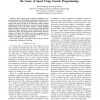1189 search results - page 56 / 238 » Information Concealing Games |
GAMEON
2003
14 years 11 months ago
2003
Game-based learning has been recognized as an important alternative or supplement to traditional in-class, face-to-face teaching. It can help both adults and children in learning ...
133
click to vote
CSCW
2012
ACM
13 years 5 months ago
2012
ACM
This paper discusses an approach for transforming solitary exercises into social exergames. We frame our discussion by highlighting the relation between the original exercises and...
ICTAI
2008
IEEE
15 years 4 months ago
2008
IEEE
We introduce and study qualitative multiple outcomes games. These games are noncooperative games with qualitative utilities (i.e., values over an ordinal scale), strictly qualitat...
CIG
2006
IEEE
15 years 3 months ago
2006
IEEE
Abstract— Many games require opponent modelling for optimal performance. The implicit learning and adaptive nature of evolutionary computation techniques offer a natural way to d...
IISWC
2006
IEEE
15 years 3 months ago
2006
IEEE
—The rapid pace of change in 3D game technology makes workload characterization necessary for every game generation. Comparing to CPU characterization, far less quantitative info...




